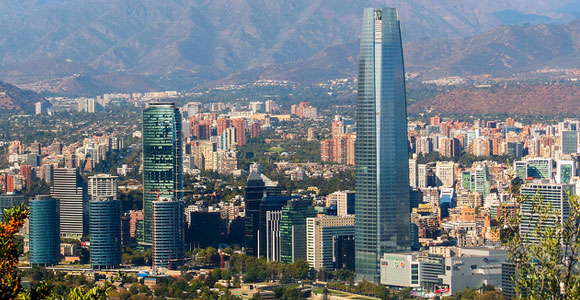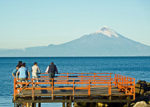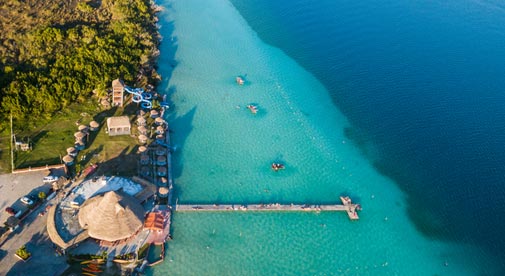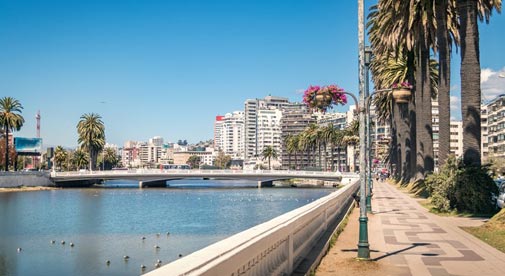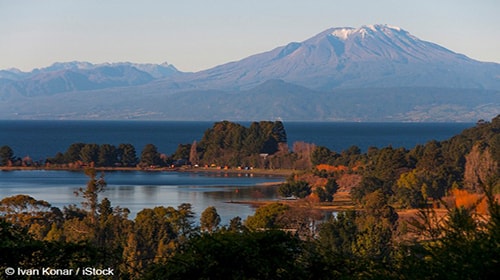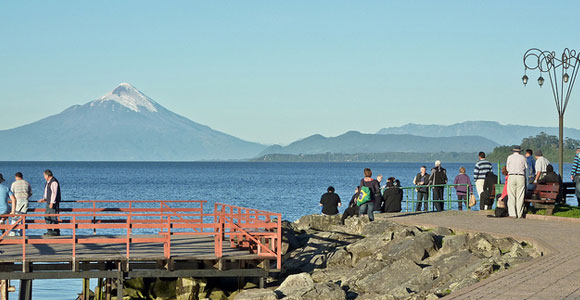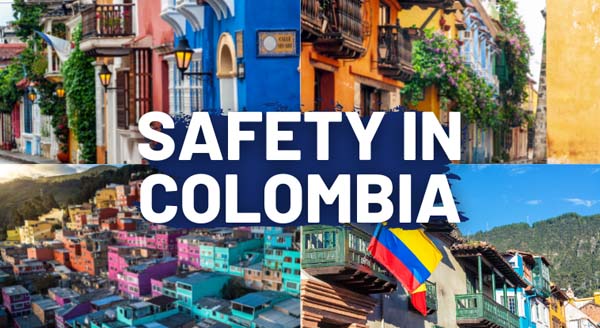The Ultimate Expat Guide to Living in Chile
Modern and efficient, Chile boasts dramatic mountain peaks, sparkling lakes, and abundant wildlife. It has great skiing in the winter and lush alpine valleys in the summer. Chains of islands and charming fishing villages lend character to the south, while wide expanses of desert dominate the north. Its clean cities offer a First-World infrastructure, and the government is one of the best-organized and most stable in the region.
Chile has one of the lowest levels of corruption in Latin America, as well as a strong economy, high standard of living, and low level of poverty. You can drink water from any tap in the country, and it has modern telephone and cell service, high speed internet, and cable television. The primary and secondary roads are well-maintained from one end of the country to the other.
Are you interested in retiring abroad? Yes | Not Sure Yet
And Chile is especially well-suited to North Americans and Europeans, partly due to its clean and honest culture, but also because its seasons are reversed from those in the northern hemisphere; so expats with a second home in Chile can enjoy their favorite seasons twice a year.
Some Interesting Facts About Chile
Location: Chile is in the southern part of South America, between Argentina and Peru. It borders the South Pacific Ocean, and has a small stretch of coastline along the Atlantic Ocean.
Area: 291,932 square miles (756,102 square kilometers). Slightly smaller than twice the size of Montana.
Population: 19,479,134
Capital: Santiago
Geography: From north to south, Chile’s geography and landscape changes dramatically. The northern region is dominated by the Atacama Desert, the world’s driest desert. As you move further south, temperatures cool and land becomes more fertile. The very south of the country is home to fjords and snow-capped mountains.
Climate: Chile has a diverse climate throughout the country. The desert areas of the north are hot and dry; a Mediterranean style climate can be found in the central region; and the southern region is cool and damp.
Currency: The legal currency of Chile is the Chilean Peso (CLP). $1 = 934.6 CLP (September 2022).
Government: Chile operates under a Representative Democratic Republic.
Head of State and Government: President Gabriel Boric (since 11 March 2022). The President is directly elected by a majority vote. A presidential term lasts for four years. A second non-consecutive four-year term is permitted.
Language: Spanish is the official language of Chile, while Mapudungun, German, and English can also be heard in some parts of the country.
Religions: The majority of the population identify as Catholic (42%), followed by Evangelical (14%). Other religions account for 6%, while 37% of people don’t follow any religion. (2021)
Time Zone: UTC-4 (1 hour ahead of Washington, DC during Standard Time).
International Country Code: +56
Internet Country Code: .cl
Life Expectancy at Birth: 80 years (Male = 78, Female = 83)
Exports: $74.8 billion
Imports: $56.4 billion
Gross Domestic Product (Purchasing Power Parity): $252.9 billion
GDP per Capita: $16,502.8
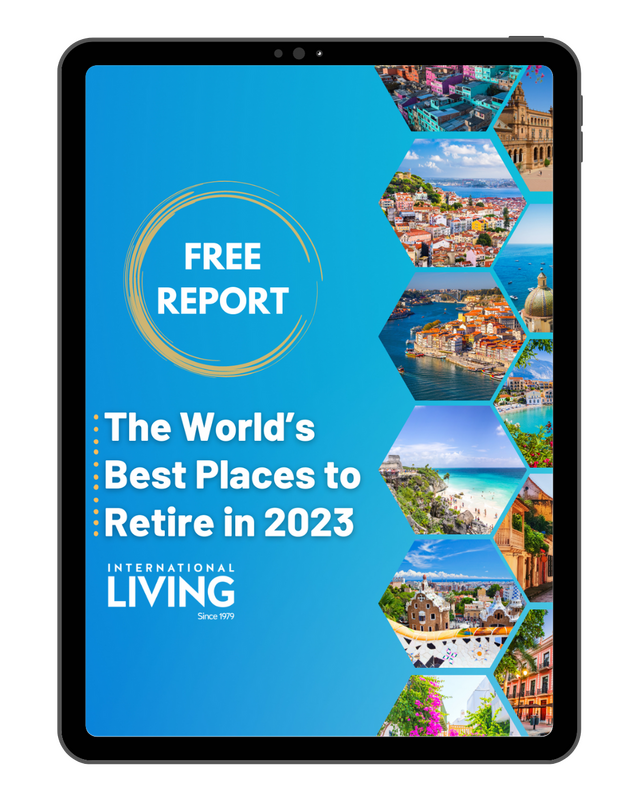
Get Your Free Report on the World’s Best Places to Retire:
Learn more about the best places in the world to retire in our daily postcard e-letter.
Simply enter your email address below to sign up for our free daily postcards and we’ll also send you a FREE report on The World’s Top 10 Retirement Havens, plus access to over 10 more free reports. Our gift to you, on our favorite destinations.
Cost of Living in Chile
You can enjoy a low cost of living in Chile. Below is a summary of monthly costs by an expat in Santiago:
| Item | U.S. $ |
| Rent | $593 |
| Building Fees | $130 |
| Electricity | $150 |
| Food | $200 |
| Staples | $100 |
| Alcohol | $80 |
| Lunches x 2 | $90 |
| Dinner x2 | $45 |
| Transportation | $20 |
| Miscellaneous | $90 |
| Monthly total: | $1,498 |
*Note: Santiago can be between 20% to 25% more expensive than other cities in Chile.
When you retire to Chile you’ll appreciate the diversity of the country
Retirement in Chile offers you just about everything. Chile is one of the safest, most politically stable countries in South America, with a well-established middle-class, good medical facilities and a well-developed infrastructure.
When you retire to Chile you’ll appreciate the diversity of the country. Watch the penguins play on the glacial fields in the south, head for the sandy beaches along the coast, go to the ski fields high in the Andes or visit the driest desert in the world in the north.
While the country as a whole has a lot to offer, Chile’s coast is one of the most overlooked and undervalued on the planet. From the white-sand beaches of La Serena to the black sands of Pichilemu, you’ll find rocky cliffs, jewel-like coves, wide beaches, world-class surfing, and great places to live. Coastal Chile boasts a diversity and beauty reminiscent of the California shoreline, but without the high property prices.
Expats who live in Chile enjoy a very high standard of living
It’s hard to imagine a country with more to offer than Chile. And when you live in Chile, you’ll enjoy a modern and efficient country which boasts dramatic mountain peaks, sparkling lakes, and abundant wildlife. It has great skiing in the winter and lush alpine valleys in the summer. Chains of islands and charming fishing villages lend character to the south, while wide expanses of desert dominate the north. Its clean cities offer a First-World infrastructure, and the government is one of the best-organized and most stable in the region.
North Americans and Europeans like living in Chile, partly due to its clean and honest culture, but also because its seasons are reversed from those in the northern hemisphere; so expats with a second home in Chile can enjoy their favorite seasons twice a year.
The Ultimate Expat Guide To Chile
Although Chile is often thought of as a less glamorous destination than its neighbor Argentina, its steady economy and democracy have convinced many people to not only visit but live and work in this South American country. Here is everything that you need to know about moving, living and working in Chile.
Introduction
Chile is a diverse country with everything from outstanding rural life in Patagonia and the Andes to the modern Santiago. The climate ranges from dry deserts in the north, a mild climate in the center to cold in the Patagonian south. Chile has desert and islands as well as mountains and even the icy Antarctica available for you to explore.
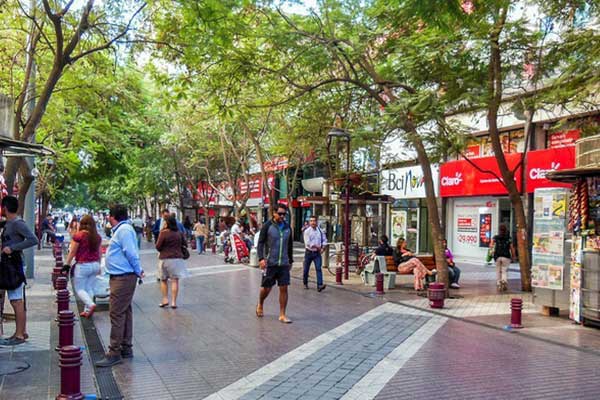
Visas
This long and narrow country offers something for everybody when it comes to geography and climate. If you are already curious what it takes to move to Chile, take a look at the different types of visas to find out for which type you need to apply for as well as what it takes to get approved.
Tourist Visas
If you prefer to visit Chile before deciding to move or look for a job, apply for a tourist visa. It can take up to four weeks for tourist visas to get approved and once approved you must go to the consulate to get your visa. If you are a citizen of the U.S., Canada, Australia, New Zealand, or any EU state, you don’t need a tourist visa to visit Chile for a stay shorter than 90 days. Citizens from the above-listed countries get a Tarjeta de Turismo (tourist card) upon arrival in Chile which they have to keep until they leave the country.
Short Term Visas
You should apply for a short-term visa, also known as temporary resident visa, if you are traveling to Chile to visit family, as an intern, as a student on a gap year doing volunteer work, or as an expat on a short-term assignment. As with the tourist visa, short-term visas can take up to four weeks to get approved and are valid for a period of one year. After you have been living in Chile for one year on a temporary resident visa, you may be eligible to apply for a permanent resident visa.
Work Visas
If you need to live and work in Chile for a period longer than one year, then you need to apply for a work visa. To get approved for this type of visa, you will need to submit a work contract, among other documents.

Get Your Free Report on the World’s Best Places to Retire:
Learn more about the best places in the world to retire in our daily postcard e-letter.
Simply enter your email address below to sign up for our free daily postcards and we’ll also send you a FREE report on The World’s Top 10 Retirement Havens, plus access to over 10 more free reports. Our gift to you, on our favorite destinations.
Living in Chile
Chile offers a low-cost of living without sacrificing on quality of life. Excellent healthcare, reasonably-priced housing, and an education system that offers a high standard of learning, make Chile a great place to live.
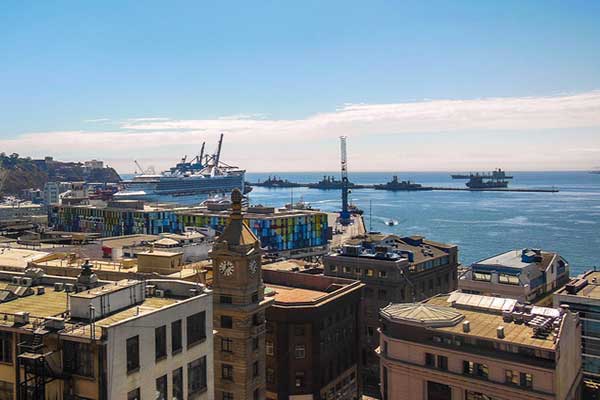
One-third of the Chilean population lives in the capital Santiago, but there are other attractive cities to live in such as Valparaíso, Valdivia, or the beautiful seaside city of La Serena.
Language
As with most of South America, Chile isn’t a place where you can get away with only speaking English. While Chile’s official language is Spanish, due to the frequent use of slang words, even Spanish speakers find it difficult to understand Chilean Spanish. But, this isn’t necessarily a bad thing because you’ll get to learn a new language.
Accommodation
The low-cost of living makes Santiago one of the best places for expats to live. But whether you decide to settle here or somewhere else in Chile, it’s important to do your research. Recently, there has been increased interest in renting houses as opposed to apartments, which means that finding an affordable house to rent can involve a great deal of competition. It’s best to manage your expectations as you begin your search for a home or apartment and be patient. In order to source good accommodation, it is recommended you have a look at newspaper ads or real estate websites or contact real estate agencies for expert help.
Transportation
While in Chile you’ll most certainly want to explore its beautiful diversity. Moving around Chile is quite easy, especially when traveling by air. Although this is the most expensive option, taking a flight saves a lot of time compared to other modes of transport and is the only option if you want to get to some of the more isolated regions in Chile’s south or to Rapa Nui (Easter Island).
However, getting your own car is also a good idea in Chile, allowing you to explore everything from Chile’s modern towns to its expansive national parks. Due to the country’s geography, keep in mind that not every car can handle the unpaved roads, so take this fact into consideration if you plan to explore the more rural parts of Chile. If you decide not to buy a car, it is preferable to travel by air or bus, as the railway system is not very well-connected and nonexistent in most of the country.
Working in Chile
Chile has one of the best economies in Latin America, which makes it an attractive destination for foreign investors and expats. However, there are some difficulties such as complex work contract requirements and getting a work visa. If you don’t speak Spanish, you will most likely need to learn, not only to find a job but also to communicate with people because most residents either don’t speak English or only have a basic command of the language.
Personal relationships are very significant in Chile meaning that it’s pretty hard to get a job in this country if you don’t know anybody. You can take a look at the newspaper listings, especially those at El Mercurio, Chile’s most popular newspaper.
Getting hired for the first time in Chile might be a bit challenging because employers prefer to hire someone who already has a work visa. On the other hand, to get a work visa you need a work contract. For this reason, if you are a newcomer to Chile international companies are your best bet, because they often have experience with the entire work permit application process that smaller companies find overwhelming.
If you are coming from a country with top-notch customer service, keep in mind that things in Chile move at a slower pace. It’s not uncommon to wait quite a while for someone to pick up the phone or reply to your email. Even your business partners might not reply to you right away if there isn’t any specific reason or immediate problem.
Expats in Chile who have a domicile in the country are considered residents, and must pay income tax no matter if they receive their paycheck from domestic or foreign companies. Non-residents get taxed only on their Chilean income for their first three years.
Thanks to the multiple foreign trade agreements and stable political climate, Chile is undoubtedly one of the best countries for expats in Latin America. Finding a job and going through the entire work permit procedure may require a little bit more time and persistence, but your efforts will be worth it due to Chiles excellent quality of life and diversity.

